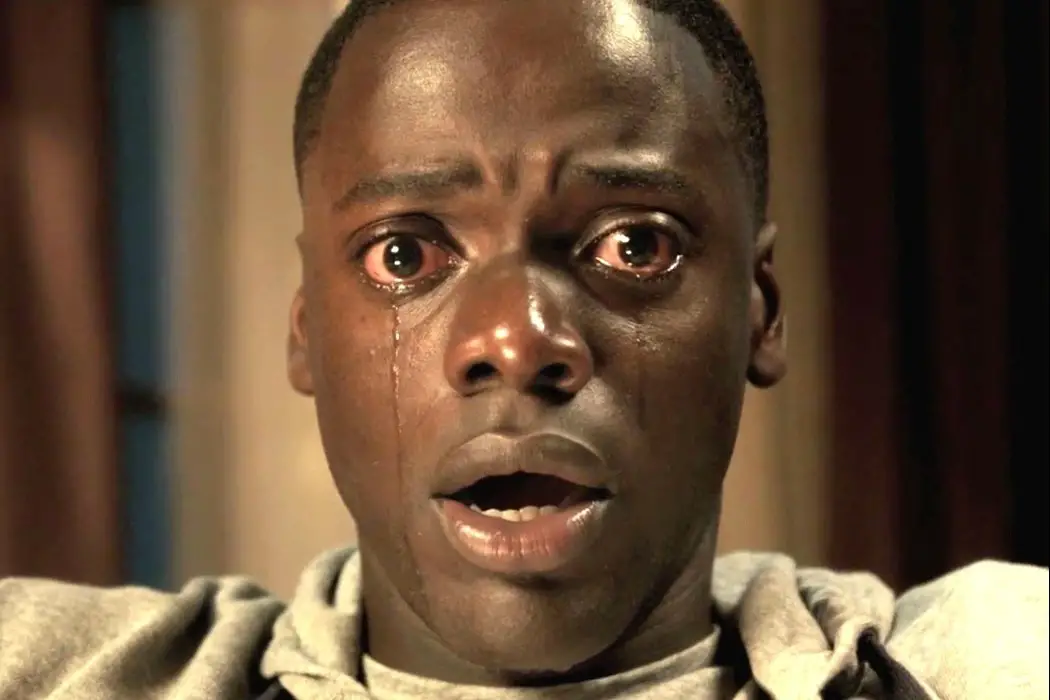Changing Fortunes: How Films Were Bolstered Or Sunk By Cultural Sentiment In 2017

Alex is a film addict, TV aficionado, and book lover.…
People have been rapidly reexamining American culture in the wake of last year’s presidential election, and with most of 2017’s American movies already in production before this began, films were being released and evaluated from a cultural perspective very different than they had anticipated.
This made some films unexpected winners, while others went down in flames. A few trends manifested throughout the year, so let’s dive into the how and why of these films’ unexpected receptions.
Momentary Confrontation Of Systemic Racism
Jordan Peele, writer and director of the horror/thriller Get Out, has proclaimed that his movie is a documentary. This was partially a joke, a ribbing response to the announcement that a movie about a black man slowly being ensnared by a rich, white family was submitted as a comedy for the Golden Globes.
To be fair, the film is pretty funny, getting big belly laughs from awkward, painful truths. It’s a wide-eyed look at the way racism manifests itself in America today, and it delivers that message through a blend of audience-friendly genres that make it difficult to categorize.

However you choose to describe Get Out, it was undeniably a massive hit, earning $175 million domestically on a $4.5 million budget. Critical and industry acclaim is so widespread that it’s considered a top awards season contender despite its early release, but the moment of its release might’ve been as crucial to its success as all the work Peele and company put into making such a sharp social critique.
Released across the U.S. on February 24th, the film came one month after President Donald Trump signed an executive order that temporarily banned travel to the U.S. from seven Muslim-majority countries. Protests popped up at airports and legal challenges were filed, with many people taking this as the first major sign that the xenophobic and racially charged rhetoric of Trump’s campaign would become official policy.
Passions were high because it was all still very new. The order came eight days after Trump was sworn in as president, and many Americans were still grappling with the implications of the election’s outcome.
White Americans were largely responsible for his win, with exit polls making it very clear that this held regardless of gender and education. Some were shocked (myself included) that a man who had never held an elected office, had flaunted his wealth as if it were proof of competency, and had blatantly used fear as a political tool could win in modern America. We should’ve known better.
Peele did. That’s why he wrote he wrote a film that lampooned the idea of a post-racial America while the first black president was still in office. The symptoms of our social hierarchy had shifted, but the country has always reasserted its chosen elite after pushes for equality, and that elite is wealthy, white men.
For proof, look no further than the mystifying process by which Americans elect our President: the electoral college. The wonky system was established by the country’s founders and came about as a compromise between a straight popular vote (as straight as can be when only white, landowning men could vote in most states) and a congressional election. It was their attempt to balance fears that the masses would be uninformed on national issues, elected officials would be too chummy to vote for the people’s best interests, and the ever-present threat that more populist states (mostly Northern) would overpower the smaller states.
The fear of the latter was inherently tied to the issue of slavery. This was stated outright by James Madison during the debate, and the approach of compromising instead of dealing with slavery has shaped American life ever since. An institution that denied people their constitutional and basic rights was allowed to persist, battles over its expansion peppered legislative work for decades (and led to a caning in the senate chamber), the Civil War was fought, Jim Crow laws passed, the Civil Rights Movement battled, and mass incarceration rose.
And yet, white Americans have a tendency of sidestepping this bitter history. Many of us only look at it when pressed, and that’s a blind spot I grew up entrenched in. My community had little diversity growing up, and that afforded me, like many who exist in the covertly segregated areas of the country, the privilege of never having to think about its daily effects.
I researched a bit to confirm my memories. The town where I went to school was 97% white in 2010 according to the U.S. Census Bureau, but the most damning piece of evidence was something that didn’t need research. The town is called Whiteland, and I wore that name emblazoned across my chest without a second thought for an embarrassingly long time.
That’s the privilege I know of white America: to be confronted with racism without really seeing it. We memorize the Gettysburg Address but don’t discuss the need for “a new birth of freedom”. We revere Martin Luther King, Jr. without thinking about if his dream was achieved. And we fall prey, again and again, to coded language that re-enforces and secures the power of our chosen elite.
Donald Trump did not change America; he just stopped coding our faults. It was a trigger that caused many white Americans to look more directly at issues of systemic and latent racism in our culture, and that translated into higher box office returns and endless think pieces about the films that took a more direct look as well.
Get Out has become the primary beneficiary of the (still predominantly white) entertainment media’s attention, but others have gotten a similar boost. I Am Not Your Negro, the documentary on James Baldwin, was released nationwide in the same month as Get Out and is the second highest-grossing documentary domestically this year.
Through Baldwin’s words, the film is littered with direct warnings to white American culture about how ignoring systemic racism destroys the country as a whole. For a moment, white Americans heeded this warning and embraced the messages of films like Get Out and I Am Not Your Negro. But the country has never looked directly at these things for long, and it’s quite possible that it’s already trying to sidestep these things again. I mean, sure, Get Out is funny, but the message it contains is no laughing matter.
The Disenfranchised Take A Blow And Logan Suffers With Them
As the tenth film in the X-Men franchise, Logan was conceived long before cultural sentiment began shifting. Even then, the decision to jump forward in time and have an aged Wolverine and Professor X was surely an intriguing idea, and 20th Century Fox’s allowance for offbeat, risky moves meant director and co-writer James Mangold could infuse his superhero film with Western elements and grapple with the latter genre’s darker themes.
But Logan doesn’t leave behind the messy history of the X-Men series, which for all of its highs and lows consistently embraced the group’s position as misunderstood outsiders. The original trilogy was very on the nose about its gay rights metaphor, and while later films would focus on Magneto’s past as a concentration camp survivor and Logan would incorporate an immigration parallel, all have consistently portrayed the X-Men as people existing on the fringe of society.

Little did they know that the confluence of these decisions would earn the finished movie the label of ‘timely’. Like Get Out, they did the hard work of making Logan a genuinely great film, but the story was complete and filming had begun even before the U.K. voted to leave the E.U. They didn’t know a shift towards conservatism would take place or that the very people the X-Men represented would be feeling as downtrodden as Logan by the time the film was released.
It’s true that even without this coincidence people still would’ve loved the film. It carefully found the parallels between Logan’s role as a brutish enforcer and a weary gunslinger reconciling with his past. It even picks up on how often he’s been paired with younger, less experienced members of the X-Men (Rogue in X-Men, the trio of teens in X2, an adrift Xavier in X-Men: Days of Future Past) and melds that onto the oft-repeated Western storyline of an old codger swooping in to help a kid in need.
But considering the timing of the production, they couldn’t have anticipated how their violent, bitter story would strike a nerve. Logan takes place after the failure of the X-Men, and because their battles were usually with the powers that be or amongst themselves, their failure only resulted in the destruction of their own community. The rest of the world is fine, and the few mutants left are mostly waiting for their end.
They only kick into action when a new generation shows up, and it’s then that their long history as stand-ins for the disenfranchised and their barely veiled conversations about civil rights movements take on a new tenor. This is no longer the Magneto vs. Professor X debate about how civil rights movements should be conducted but a portrait of those who tried, failed, and are coming to terms with their role in the movement.
Even a cursory examination of real civil rights movements show that they ebb and flow, with ground being gained, lost, and gained again. There’s a fault with democracy at play here, as minority groups are forced to appeal to the majority and wait until they are receptive to change. In practice, this means that there are people who fight the good fight without making much progress, and perhaps the best they have to show for their efforts is a fresh generation ready to take advantage when the majority is open to their ideas.
Whether purposefully or not, Logan taps into this generational perspective by having Wolverine and Xavier fighting not for themselves or their contemporaries but for Laura and her friends. Nor does it ignore the weariness and pain of viewing your life’s work through such a long lens, especially if you are subjected to consistent vitriol and hate from the world at large.
The brutal violence in Logan is an extension of that hate, something that has been forced on Wolverine his whole life. There was a telling exchange way back in X-Men that colors this dynamic: Rogue asked Wolverine if his claws hurt when they come out, and he responds with ‘every time’. From that, you understand that every decision by Wolverine to fight has come at an immediate personal cost, and the shot in Logan of Wolverine and Laura’s entwined, bloodied hands implies a shared pain and violence that’s being tragically passed down.
Still, Logan ends the movie by getting the claws out one last time, and if the image of his battered body limping through another battle is resonant, then it’s because he’s finally understood the reason he fights.
Allegations Cause Mass Derailments
In case you’ve been living under a rock, the world has suddenly realized that it should take accusations of sexual assault and harassment seriously. Powerful men who were previously able to sweep allegations under the rug are being held accountable, and the about-face with which the entertainment industry now responds to these accusations has cause a multitude of projects to go up in flames.
There’s the highly publicized fallouts like I Love You, Daddy, All the Money in the World, and any film associated with Harvey Weinstein, but to list those would become a tedious and frankly depressing exercise. They went down for obvious reasons, but there’s been a casualty of this movement that provided a more subtle reflection of the changing times.

Battle of the Sexes is a well-reviewed, scandal-free project that completely belly-flopped at the box office. The film, based on the real-life tennis match between Billie Jean King and Bobby Riggs, is a celebration of feminism and one of its greatest champions, and on paper it seemed like a slam dunk.
Then the trailer came out, which accurately reflected the film’s jovial tone but immediately raised eyebrows. Were we really being expected to laugh at casual sexism? Are we supposed to empathize with the self-proclaimed male chauvinist pig? As it turns out, yes and yes, and since the film opened in the U.S. post-David Faraci and pre-Harvey Weinstein, no one was having it.
It’s not that the positive critical response to the film was off-base; Emma Stone and Steve Carrell make Billie Jean and Bobby charming while navigating complicated character arcs, and directors Jonathan Dayton and Valerie Faris present the film with a playful period aesthetic. The lighter tone just happens to feel like a film conceived before a guy who said “grab ’em by the pussy” won the White House.
In much the same way that Trump’s openly racist remarks made racism harder to ignore, he did the same thing for sexism and harassment. Many people have made the connection between his election and the change to holding accused men responsible, and while some go farther back and cite Bill Cosby’s trial as an early sign that times were changing, the flop of Battle of the Sexes seems much more intimately tied to Trump’s campaign.
As shown in the film and as it was in real life, the Battle of the Sexes was simply an exhibition match, but one that had drastically different stakes for the two players involved. Bobby was just hustling, and he saw a marketing bonanza by framing the match around the women’s liberation movement. Billie Jean had gotten stuck with a guy prodding her to play, but she wasn’t about to jeopardize her push for equal pay between men and women players for a silly charade.
Then Margaret Court lost to Bobby, and Billie Jean’s stance was jeopardized through no fault of her own. To her, the match with Bobby meant standing up for her gender and validating a movement; to Bobby, it was about cash and pride.
Sound familiar? Hilary Clinton ran a campaign against a media showboat and took time in her concession speech to tell little girls to “never doubt that you are valuable, and powerful, and deserving of every chance and opportunity in the world to pursue and achieve your own dreams.” It was a moment that acknowledged the broader meaning of her campaign and her loss, and it was something that Trump never would’ve had to say to boys.
But Clinton did lose, and Battle of the Sexes was ignored. By the time it came out, people who cared about sexism weren’t looking for a victory lap; they were looking for a spark.
Conclusion
Cultural sentiment is always in flux, but the past year has seen more rises and falls than anyone anticipated. This seems destined to continue into the next year, and if the turbulence has left you feeling unsteady, know that you are in good company.
What films did you see in a different light this year? Do you think the filmmakers intended you to see them that way? Let us know in the comments!
Does content like this matter to you?
Become a Member and support film journalism. Unlock access to all of Film Inquiry`s great articles. Join a community of like-minded readers who are passionate about cinema - get access to our private members Network, give back to independent filmmakers, and more.
Alex is a film addict, TV aficionado, and book lover. He's perfecting his cat dad energy.













